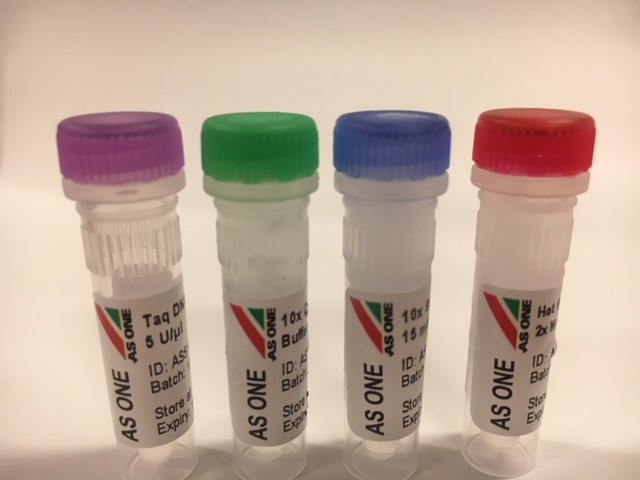Description
Betaine Enhancer Solution
Concentration: 5 M
Cat. No. |
Product |
Volume |
AO351104 |
5 M Betaine Enhancer Solution |
5 x 1 mL |
Store at -20°C. For in-vitro laboratory use only
General Description
Three factors make a particular enhancer desirable: high potency, high specificity and a wide effective range, or window of applicability. Based on these criteria, Betaine Enhancer Solution has been selected as one of the most effective additives over a wide range of different templates, including GC-rich sequences and templates known to be extremely difficult to amplify. Betaine Enhancer Solution is an excellent enhancer especially when used with GC-rich regions or templates with a high degree of secondary structures.
Function of Betaine Enhancer Solution
The performance of Betaine Enhancer Solution is superior compared to standard enhancers such as formamide, DMSO, TMAC, BSA and non-ionic detergents because of the following effects: Betaine binds preferentially to AT rich sequences in the major groove, thereby stabilizing AT rich regions of the DNA. Because AT forms 2 hydrogen bonds and GC forms 3, the bonding of AT is less stable than the one of GC. As a consequence of the stabilizing effect of Betaine on AT bonding, the stability of AT bonding and GC bonding is brought close to an equal level. At the same time, Betaine has a sequence independent destabilizing effect on all DNA. Summarized, the Tm of AT rich and GC rich sequences are equalized and the overall Tm is lowered. Furthermore, Betaine aids the processivity of thermostable polymerases and reduces “pauses” in polymerization caused by secondary structure that can induce the polymerase to disassociate from the DNA strand.
Betaine Enhancer Solution
5 M Betaine in solution in PCR-grade H2O
Storage and Stability
The unopened product is stable at -20°C for 2 years after the production date.
Pre-protocol Considerations:
Betaine has a decreasing effect on the melting temperature of DNA and primers. Therefore denaturation temperatures as well as primer annealing temperatures should be reduced by 1–5°C. The optimal annealing temperature should be determined individually for each reaction.
Determining the optimal buffer / enhancer combination for your application.
By running the following reactions using different buffers with and without enhancer, the optimal reaction conditions should be found for the specific application. For an example see figure 1.
- 1x Standard Buffer
- 1x Standard Buffer / Betaine (final concentration 1 M)
- 1x Combination Buffer
- 1x Combination Buffer / Betaine (final concentration 1 M)
MW MW Buffer: Standard Combination Betaine: – + – +
Figure 1: Efficacy of different buffer – enhancer combination cDNA was PCR amplified using the indicated conditions and equal amounts of the reactions were loaded on an agarose gel.
- Set up each PCR reaction as in table 1.
- Mix gently by pipetting the solution up and down a few times.
|
Table 1. Reaction components (master mix and template DNA)
|
|
- 3. Add template DNA to the individual tubes containing the master mix.
- Program the thermal cycler according to the manufacturer’s instructions. Each program must start with an initial heat activation step at 95°C for 15 minutes.
Remember: For best results, annealing temperatures have to be lowered by 1 – 5 °C when using Betaine.
- Place the tubes in the thermal cycler and start the reaction.
Three-step PCR program without Betaine
| Cycles | Duration of cycle | Temperature |
| 1 | 15 minutes | 95°C |
| 25 – 35 | 20 – 30 secondsa
20 – 40 secondsb 30 secondsc |
95°C
50 – 65°C 72°C |
| 1 | 5 minutesd | 72°C |
Three-step PCR program with Betaine
| Cycles | Duration of cycle | Temperature |
| 1 | 15 minutes | 95°C |
| 25 – 35 | 20 – 30 secondsa
20 – 40 secondsb 30 secondsc |
95 °C
45 – 50°C 72°C |
| 1 | 5 minutesd | 72°C |
- For activation of the HS Taq Polymerase enzyme.
- Denaturation step: This step is the first regular cycling event and consists of heating the reaction to 95°C for 20 – 30 seconds. It causes melting of the DNA template by disrupting the hydrogen bonds between complementary bases, yielding single-stranded DNA molecules.
- c. Annealing step: The reaction temperature is lowered to 50 – 65°C for 20 – 40 seconds allowing annealing of the primers to the single-stranded DNA template. Typically, the annealing temperature is about 3 – 5°C below the Tm (melting temperature) of the primers use
- Extension/elongation step: HS Taq polymerase has its optimum activity temperature at 72°C. At this step the DNA polymerase synthesizes a new DNA strand complementary to the DNA template strand. The extension time depends on the length of the DNA fragment to be amplified. As a rule of thumb, at its optimum temperature the DNA polymerase will polymerize a thousand bases per minute.
- Final elongation: This single step is occasionally performed at a temperature of 72°C for 5 minutes after the last PCR cycle to ensure that any remaining single‐stranded DNA is fully extended.



Reviews
There are no reviews yet.